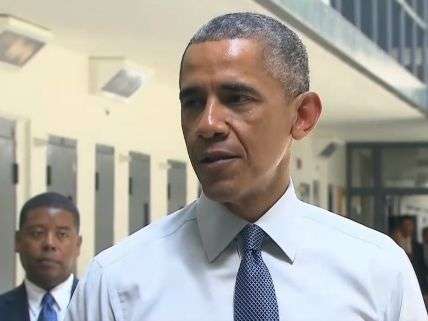Obama's Mercy Still Pales Next to Richard Nixon's
Obama has granted about 1 percent of commutation petitions, compared to Nixon's 7 percent.

The 61 commutations that President Obama announced yesterday bring his total so far to 248, which the White House emphasizes is "more than the previous six Presidents combined." Yet those commutations represent just 1.3 percent of the nearly 20,000 petitions he has received.
By that measure, Obama is more merciful than Ronald Reagan or either of the Bushes, about as merciful as Bill Clinton, and substantially less merciful than Jimmy Carter or Gerald Ford, who granted, respectively, 2.8 percent and 4 percent of the commutation petitions they received. And Obama's mercy still pales compared to Richard Nixon's. Tricky Dick, whom the White House omitted from its comparison, granted shorter sentences to 6.7 percent of the federal prisoners who sought them—not bad for a law-and-order Republican who, according to senior Nixon adviser John Ehrlichman, saw his war on drugs as a way to attack "the antiwar left and black people."
Largely because of the war on drugs and the draconian sentences associated with it, Obama has received a lot more commutation petitions than his predecessors—twice as many as George W. Bush, 22 times as many as Nixon. To say that Obama has struggled to keep up would be both an exaggeration and an understatement. During his first term, when he granted just one commutation, he showed almost no interest in using his clemency powers to ameliorate the injustices inflicted by a criminal justice system he had long criticized as excessively harsh. A couple of years after he was re-elected, he picked up the pace, but not enough to put much of a dent in what is now a 9,000-petition backlog at the Justice Department's Office of the Pardon Attorney—and that's not counting another 9,000 or so cases that volunteer lawyers at Clemency Project 2014 are reviewing at the administration's behest.
"At his current pace," The New York Times notes, "Mr. Obama will free a small fraction of those prisoners by the time his term ends next year." Even if he managed to grant 61 commutations every month, which would represent a big increase from his recent pattern (the last batch of commutations, which freed 95 prisoners, was in December), he would not hit the "thousands" foreseen when the DOJ signaled a new receptiveness to clemency petitions in 2014. Or even 1,000.
Congress could accomplish more by approving sentencing reform (which Obama supports). As with previous batches, most of the commutations announced yesterday involved prisoners convicted of crack cocaine offenses who would have received shorter sentences under current law. Retroactively applying the lighter crack penalties that Congress approved in 2010, as the Sentencing Reform and Corrections Act would do, could by itself free 5,800 drug war prisoners.


Show Comments (8)